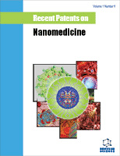Abstract
Nanotechnology can address key bottlenecks hindering successful bench to bedside translation of recent research in the development of neuropeptide-based drugs. This is the case for vasoactive intestinal peptide (VIP), where sustained interest in its therapeutic applications needs to devise new methodologies to improve its drugability or to convey innovation to diagnostics to identify cells that result from conditions such as carcinoid metastasis in which VPAC receptors are involved. We analyze here current technologies and patent disclosing methods on surface functionalization or encapsulation to obtain VIP engineered nanoparticles.
Keywords: Engineered Nanoparticles, Vasoactive Intestinal Peptide, Neuropeptide, VIP, VIP receptors, cancer, immunomodulation, surface funcionalization, drug delivery, therasnostic systems, nano-systems, septic shock, neurodegenerative diseases, tumor imaging agent, peptide encapsulation, enzymatic degradation, biodegradable nanoparticles, Neuropeptides
 13
13

